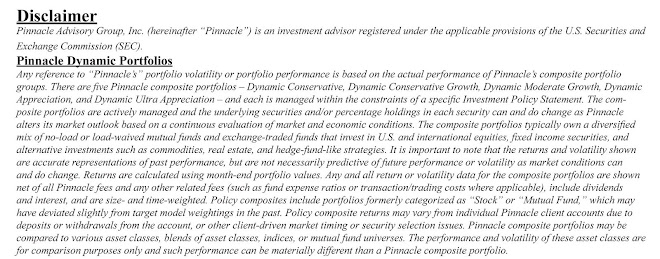As a solution, Wall Street suggests we invest in managers who implement strategies designed to deliver returns independent of markets. That is why the investment universe includes private equity, hedge funds, managed futures, and other low correlation strategies. The problem here is that managers make mistakes, and go 'hot' and 'cold' in delivering returns on a systematic basis. Strategies work until the market arbitrages the excess returns to… well… market returns. In the worst case, managers can 'blow up,' creating havoc with an investor’s portfolio.
The question remains, which approach is better? The answer is neither. Both approaches offer investors rewards along with a clear set of risks. Pinnacle has addressed this problem by creating a portfolio construction process that utilizes the best of both philosophies. Our portfolio asset allocation must stay within well-defined limits of volatility that are based on the past performance of markets. We respect the idea that past performance, while not a guarantee of future results, does give us a rational basis to begin to forecast future returns. We believe that individual markets, or asset classes, are efficient enough so that we don’t try to pick winning stocks or bonds within an asset class, and are content to own industries, sectors, and countries using ETFs and mutual funds. However, we also recognize that the performance of markets depends on the market cycle, the psychology of investors, and the valuation of markets. Therefore, we think it’s important to be active managers.
We defend against the problems with active management in a variety of ways.
- We have an investment team instead of one stellar senior manager who can have hot and cold streaks.
- We trade incrementally based on changes in the data so that we can avoid large market timing errors.
- We are non-dogmatic in our approach to discovering value, so we look at value in three different ways.
- We use both qualitative and quantitative methods to make investment decisions.
- We use a relative value approach that encourages us to stay within striking distance of our benchmark allocations.
- We try to hit 'singles and doubles' rather than making large bets that are win/lose propositions.
Our assumption is that all active managers will make investment mistakes. We try to make fewer mistakes than the consensus, which has been a great recipe for earning positive risk adjusted returns.

